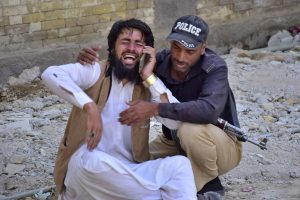Amid a tense financial and political situation in the country, Pakistan has decided to launch an “all-out comprehensive operation” to rid the country of terrorism.
The decision came amid a surge in attacks on security forces by the Tehreek-e-Taliban Pakistan, which in November of last year unilaterally ended a ceasefire with the Pakistani government.
The decision on a “comprehensive operation” was made at a recent meeting of the National Security Committee (NSC). An all-out operation with renewed vigor and determination will be launched with the participation of the entire country and government.
The NSC attributed the recent spate of terrorism in Pakistan to the “thoughtless policy” adopted by the Pakistan Tehrik-e-Insaaf government towards the TTP after the Taliban takeover of Afghanistan in August 2021.
Under this policy, the Pakistani state held talks with the militant outfit and rehabilitated its fighters instead of trying to eliminate them inside and outside the country. In addition, it was based on the flawed expectation that the Afghan Taliban would hand over the TTP leadership to Pakistan and shut down the group’s sanctuaries in Afghanistan.
According to the NSC, the policy adopted by the PTI government resulted in terrorists being allowed to return unhindered to the country and dangerous TTP terrorists being released from jails in the name of “confidence building” measures.
However, this will not be the case going forward.
Last week, Chief of Army Staff Gen Syed Asim Munir told members of the National Assembly that the strategy to engage terrorists had allowed them to regroup. Promising to follow a “zero-tolerance policy against militants and their facilitators,” the army chief suggested a multidimensional strategy based on the cooperation of security forces, the legal community, civil society, politicians, social workers, bureaucracy, diplomats, and the media in deterring and neutralizing militant groups.
The new comprehensive military strategy will focus on eliminating terrorist activities even as it avoids a full-scale anti-terror operation that could have unintended consequences. During his in-camera briefing with legislators, the army chief reportedly dispelled the impression of waging a full-scale anti-terror operation in the tribal areas bordering Afghanistan.
This is a shift from the conventional military response to terrorism, which involves large-scale combat operations, which have often been ineffective in resolving the issue.
The army chief’s suggestion is widely seen as an attempt to find a more sustainable solution to terrorism in these areas, involving not only the use of military force but also engaging with local communities and providing economic opportunities to reduce poverty and create jobs.
Pakistan has finally accepted that TTP’s safe havens in Afghanistan should be eliminated, and the collaboration between the group and the Islamic State Khorasan (IS-K) be cut off to weaken the group. This will require Pakistan to work with Afghanistan to combat the terrorist threat.
However, this is no easy task as it requires a great deal of collaboration and cooperation between both countries. To date, the Pakistani government has had difficulty convincing the Afghan Taliban to stop supporting the TTP and work with Islamabad to confront threats posed by IS-K.
Last week, Pakistan’s Defense Minister Khawaja Asif once again issued a warning to the Taliban regime in Afghanistan, saying that Islamabad is prepared to strike terrorist hideouts inside Afghanistan if the Taliban regime failed to rein it in. “We have communicated to Kabul during our last visit that please, as our neighbors and brothers, whatever is emanating from Afghan soil is your responsibility,” he said.
“If that is not done, at some point we’ll have to […] resort to some measures, which will definitely — wherever [terrorists] are, their sanctuaries on Afghan soil — we’ll have to hit them,” he said. “We’ll have to hit them because we cannot tolerate this situation for long,” he reiterated.
In his recent conversation with parliamentarians, the army chief emphasized the importance of elected representatives determining the country’s destiny. He stated that the army will fully support them in this journey and that it is their duty to ensure that democracy prevails.
Amid the ongoing financial and political crisis in the country, the army chief’s speech provides hope.

































